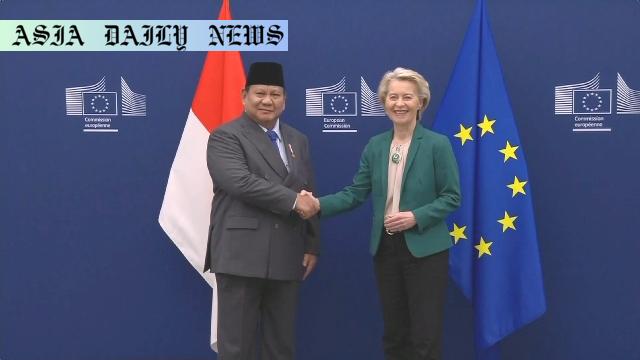Trade Deal: Indonesia and the EU seal a political agreement for a Comprehensive Economic Partnership aiming for September finalization.
Trade Deal agreed between Indonesia and the EU after nearly ten years of negotiation.
Comprehensive Economic Partnership aims for September finalization, fostering agriculture, automotive, and service industries.
Negotiations reflect diversification of trade ties amid global tariff concerns.

Introduction: The EU-Indonesia Trade Deal Breakthrough
The European Union (EU) and Indonesia have reached a pivotal moment in their decade-long trade negotiation efforts by agreeing to move forward with a Comprehensive Economic Partnership Agreement (CEPA). This breakthrough marks a significant commitment from both sides to deepen bilateral trade relationships, enhance economic collaboration, and diversify their trading portfolios. The announcement comes as a notable milestone amidst shifting global trade dynamics and growing economic integration efforts worldwide.
Strategic Importance of the CEPA
The Comprehensive Economic Partnership Agreement is a testament to the growing strategic trade collaboration between Europe and Southeast Asia’s largest economy. Indonesian President Prabowo Subianto, after meeting European Commission President Ursula von der Leyen, emphasized Europe’s economic significance, signaling Jakarta’s aim to attract greater European investment and participation. Von der Leyen echoed these sentiments, highlighting the historic trade deal as an enabler of new market opportunities while creating openings for businesses concentrated in agriculture, automotive manufacturing, and services. With the aim to finalize by September, this agreement sets the stage for bolstered economic relations.
Diversification of Trade Amid Global Uncertainty
The backdrop of the EU-Indonesia agreement reflects broader global economic challenges, including trade turbulence triggered by past US tariff policies. Both the EU and Indonesia are striving to diversify trade partnerships to mitigate risks posed by reliance on a singular large market such as the United States. In this context, the CEPA serves as a proactive approach to ensure economic stability and resilience, while fostering collaboration across critical industries pivotal to both parties.
Competitive Landscape and ASEAN’s Growing Trade Focus
Interestingly, this agreement is part of a regional wave of accelerating free-trade engagement by Southeast Asian nations. Neighboring countries such as Thailand and Malaysia are pursuing free-trade agreements with the EU, highlighting the competitive landscape. Indonesia’s proactive stance, where political agreements are already sealed, underscores its determination to maintain its economic edge in the region by facilitating substantive engagements with European markets.
The Broader Economic Implications
The EU-Indonesian trade initiative highlights a broader vision of economic inclusion, innovation, and sustainability. As businesses across agriculture, automotive, and service sectors gear up for new opportunities, employment, production efficiency, and technological exchange are poised to gain momentum. Moreover, the multi-faceted nature of the agreement speaks to the priorities of creating resilient supply chains and fostering international cooperation at a time when economic interconnectivity is indispensable.
Conclusion
The CEPA between the EU and Indonesia reflects the transformative potential of comprehensive trade agreements in reshaping global partnerships. With its focus on expanding bilateral economic ties and leveraging diverse sectoral advantages, this trade deal is not only significant in its political and economic scope but also indicative of a forward-looking commitment to shared prosperity. As negotiations progress towards a finalized agreement in September, the deal is a hopeful milestone showcasing the power of constructive international collaboration.
Commentary
Assessing the EU-Indonesia Trade Agreement Landscape
The announcement of the EU-Indonesia trade pact is a remarkable indicator of how global partnerships can evolve and reset priorities within an ever-changing trade ecosystem. With geopolitical dynamics influencing national trade strategies, this agreement affirms the strategic position of economic diversification. For Indonesia, engaging deeply with the EU not only underscores its relevance in international trade, but also its readiness to attract investment and collaboration in burgeoning industries. Such alignments demonstrate the capacity of emerging economies to redefine their role in global commerce.
The Competitive Edge of Proactive Policies
In parallel, ASEAN nations including Thailand and Malaysia pursuing similar agreements reveal the competitive and urgent nature of international trade negotiations today. By moving swiftly to finalize its partnership with the EU, Indonesia places itself in a unique position to access European markets sooner than its regional counterparts. This emphasizes how proactive and forward-thinking policymaking can yield strategic advantages in fostering economic growth and sustainability.
Broader Takeaways and Lessons
Overall, this development should serve as inspiration for other nations globally. It underscores the necessity of agility in policymaking, innovation-driven strategies, and the mutual benefits of collaborative economic frameworks. The partnership offers Indonesia an avenue to grow its industrial base, while providing the EU a new gateway to one of Asia’s most dynamic economies. As the deal nears finalization, the onus lies on both sides to ensure equitable and thoroughly negotiated terms that can inspire similar models elsewhere.


